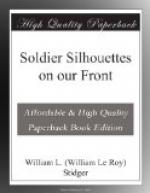And that’s just what he does. I’ve been in some twenty-five or thirty air-raids in four or five cities of France, and I have never yet seen many Americans who took to the “abris.” They all want to see what’s going on, and so they hunt the widest street, and the corner at that, to watch the air-raids.
One night during a heavy raid in Paris, when the French were safely hidden in the “abris,” because they had sense enough to protect themselves, I saw about twenty sober but hilarious American soldiers marching down the middle of the boulevard, arm in arm, singing “Sweet Adelaide” at the top of their voices, while the bombs were dropping all over Paris, and a continuous barrage from the anti-aircraft guns was cannonading until it sounded like a great front-line battle.
That night I happened to be watching the raid myself from a convenient street-corner. Unconsciously I stood up against a street-lamp with a shade over me, made of tin about the size of a soldier’s steel helmet. Along came a French street-walker, looked at me standing there under that tiny canopy, and with a laugh said as she swiftly passed me, “C’est un abri, monsieur?” looking up. The air-raid had not dampened her sense of humor even if it had destroyed her trade for that night.
[Illustration: The air-raid had not dampened her sense of humor.]
Another story illustrative of the never-die spirit of the Frenchwomen, in spite of their sorrows and losses: One night, when the rain was pouring in torrents, a desolate, chilly night, I saw a girl of the streets plying her trade, standing where the rain had soaked her through and through. Were her spirits dampened? Was she discouraged? Was she blue? No; she stood there in the rain humming the air of an opera, oblivious to the fact that she was soaked through and through, and cold to the bone.
This is the undying spirit of France. I do not know whether this girl was driven to her trade because she had lost her husband in the war, but I do know that many have been. I do not know anything about her life. I do know that there she stood, soaked through and through, a frail child of the street, plying her trade, and singing in the rain. The silhouette of this frail girl and her spirit is typical of France: “Her head though bloody is unbowed.” Somehow that sight gave me strength.
The reaction of the German submarining in American waters on the boys “Over There” will be interesting to home-folks. When the news got to France that submarines were plying in American waters near New York, did it produce consternation? No! Did it produce regret? No! Did it make them mad? No!
It made them laugh. All over France the boys laughed, and laughed; laughed uproariously; doubled up and laughed. I found this everywhere. I do not attempt to explain it. It just struck their funny bones. I heard one fellow say: “Now the next best thing would be for a sub some night, when there was nobody in the offices, to throw a few shells into one of those New York skyscrapers.”




